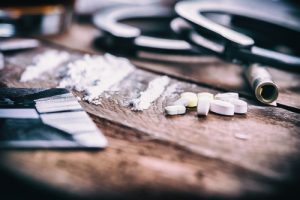
U.S. Rep. John Katko (R-NY) testified before a congressional panel on Tuesday about the importance of passing legislation he introduced to give law enforcers new tools to crack down on the trafficking of synthetic drug analogues.
U.S. Rep. Bob Goodlatte (R-VA), the chairman of the House Judiciary Committee, led members of the Subcommittee on Crime, Terrorism, Homeland Security and Investigations in probing the synthetic drug epidemic and also the merits of Katko’s bill, the Stop the Importation and Trafficking of Synthetic Analogues (SITSA) Act, H.R. 2851.
“The synthetic drug epidemic has swept our nation and crippled communities in Central New York,” Katko testified. “Just a few weeks ago, Syracuse area hospitals saw a record number of overdoses due to synthetics abuse,” he noted, adding that first responders also have seen increases in calls due to synthetic overdoses.
Katko’s bill aims to help stop the illegal importation and distribution of synthetic drugs and would support law enforcement in protecting communities. Specifically, the bill would establish a new schedule under the Controlled Substances Act (CSA), Schedule A, for 13 synthetic analogues, which have been identified by the Drug Enforcement Agency as an immediate threat to public health. The attorney general would be able to add new variations, or analogues, of synthetic drugs to Schedule A on a temporary or permanent basis in under 30 days.
The legislation also sets tough penalties for foreign manufacturing and importation of synthetic drugs and provides a multi-step sentencing process which includes application of existing federal guidelines.
“The goal of this legislation is to not only prevent drug abuse, but to facilitate proper research so that we may better understand these chemical compounds,” Katko said.
Goodlatte noted during the hearing that the powerful synthetic opioid fentanyl was the deadliest drug in Virginia in 2016, and that a new synthetic opioid, carfentanil, that is 100 times more potent than fentanyl, has been linked to numerous overdose deaths across the country this year.
“The Controlled Substances Act expresses federal U.S. drug policy by which the manufacture, importation, distribution, possession and use of certain substances are regulated,” Goodlatte said. “Synthetic drugs, once called ‘designer drugs’ but now known as new psychoactive substances, are posing a serious public health threat, and this bill would update federal law to provide prompt action to stop the unlawful importation and distribution of synthetic drugs.”
Goodlatte said Katko’s bill struck a balance between protecting the American public from deadly drugs and promoting the safe research of new substances.
While users of synthetic drugs are at risk of overdose, Katko noted during his testimony that law enforcers and first responders have also been put into harm’s way by these substances, in some instances resulting in death.
“… Unfortunately, when law enforcement encounters a specific synthetic drug compound, manufacturers of these substances are able to slightly alter the chemical structure of the drug,” Katko said. “This puts law enforcement at a serious disadvantage and are constantly one step behind them. As a former U.S. attorney, but more importantly, as a father, getting these drugs off the streets and out of the hands of our loved ones remains a top priority for me.”
Goodlatte noted that China’s National Narcotics Control Commission recently announced scheduling controls against four new synthetic drugs, a culmination of cooperation between the DEA and the Chinese government. Still, there are more than 400 synthetic drugs being imported and distributed in the United States, many of which are technically legal, he said.
“H.R. 2851 finally gives U.S. law enforcement nimble tools to react as soon as these deadly drugs arrive in our country so we can collectively, through enforcement, treatment and education, retake our communities from the plague of synthetic drugs,” Goodlatte said.



